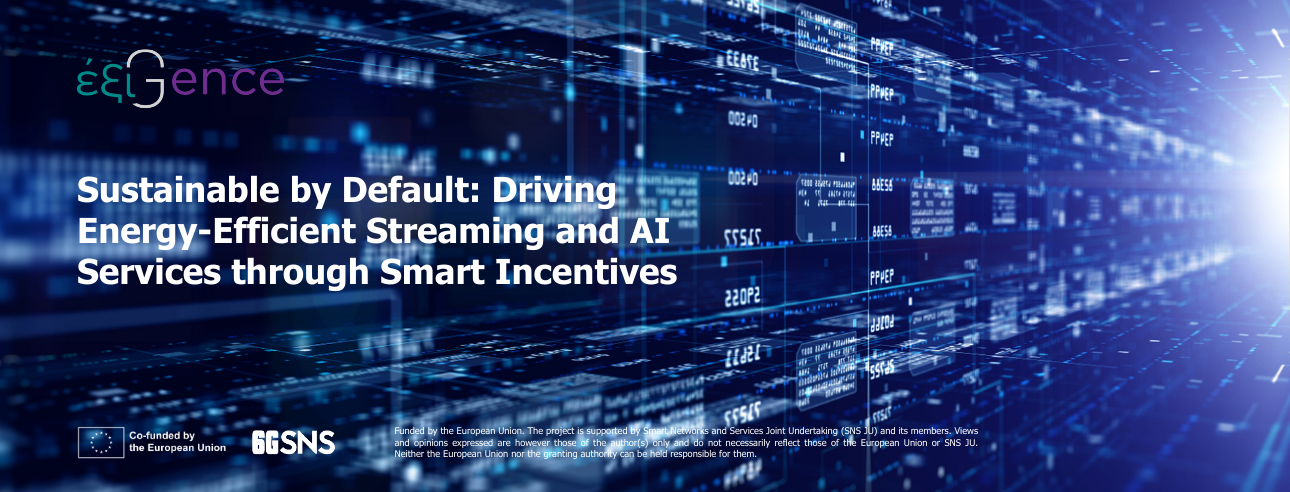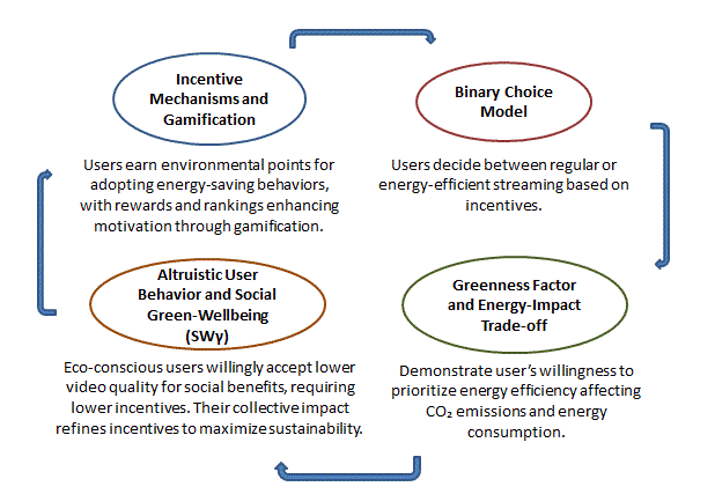
Part A: Streaming Smarter: Incentives for a Greener Digital Future
In today’s hyperconnected world, streaming media is second nature – but it comes with an invisible cost: energy consumption and carbon emissions. This is where EXIGENCE project and the Services Technologies and Economics STEcon group of Athens University of Economics and Business (AUEB) steps in, aiming to reshape how users interact with digital services by introducing a new generation of incentive mechanisms that promote energy efficiency and sustainability without compromising experience.
The Core Idea: We (STEcon AUEB) are developing a framework that motivates ICT service consumers – focusing here on video streamers – to make energy-conscious choices. Instead of relying solely on financial rewards, we tap into behavioural incentives like eco badges, peer recognition, and gamified challenges. These are complemented by economic motivators, thus constituting a balanced and holistic mechanism that appeals to both altruistic and self-interested users.
Environmental Points: At the heart of this approach is a unified incentive metric, referred to as Environmental Points. These points quantify the value of sustainable actions, such as choosing lower video resolutions, and can be redeemed for rewards or for recognition. Over time, this system encourages (and actually educates) users to adopt greener habits, reducing the overall carbon footprint of digital services.
Modelling User Acceptance: To validate our approach, we have built a user acceptance model that simulates how individuals respond to incentives. It is based on a binary decision framework: each user either embraces the offered incentive and thus streams her video sustainably or continues with her usual streaming habits. Key elements of this model include:
- Greenness Factor: Reflects how much each user personally values sustainability in their viewing experience.
- Mean Opinion Score (MOS): Measures perceived quality loss from lower video bitrates.
- Social Green-Wellbeing (SWγ): Captures the collective impact of eco-conscious user behaviour.
Altruism Meets Analytics: Some users are naturally inclined to act sustainably. These altruistic individuals require lower incentives, as they derive satisfaction from contributing to the broader well-being. Over time, behavioural education can shift more users toward this mindset, thus reducing the need for economic rewards and amplifying the system’s effectiveness.
Enabled by EXIGENCE: This holistic framework is enabled by EXIGENCE, which aims to verifiably reduce the net energy consumption and carbon footprint of ICT services in next-generation mobile systems. EXIGENCE addresses the goal of sustainability, by delivering measurable reductions in energy and CO₂ emissions, through iterative analysis and long-term impact strategies.
Gamification and Feedback: To keep users engaged, we envision a gamified approach, with elements like leaderboards and monthly “green champions”, making sustainability both visible and rewarding.
The Bigger Picture: By combining behavioural science, economic modelling, and real-time environmental data, we are creating a feedback loop that gradually reshapes user behavior. The effect of this approach? A more sustainable digital ecosystem where every stream counts.

Figure 1 Effective user acceptance model for energy-efficient video streaming
Part B: Energy and Carbon Efficient AI Services
Beyond streaming, the EXIGENCE project also targets one of the fastest growing sources of ICT energy use, namely Artificial Intelligence (AI). In fact, the project addresses both AI Training and AI Inference services.
AI services operate through two key phases: training and inference. Training involves feeding massive datasets into algorithms so that the model can learn patterns, relationships, and decision-making rules; this is typically done by developers or researchers using powerful computing resources. Once trained, the model enters the inference phase, where it applies its learned knowledge to new data in real time. This is the part most users interact with directly, whether it is through voice assistants, recommendation systems, or image recognition tools. The EXIGENCE project focuses on making both phases more efficient in terms of both energy and carbon emissions, recognizing that as AI becomes more embedded in everyday life, its environmental footprint must be addressed timely alongside its technological advancement.
Training of AI models consumes vast amounts of energy, outpacing the benefits of efficiency gains. To make AI sustainable, incentives must align the interests of participants, from users and service providers to energy suppliers.
From framework to model: Our starting point is an incentive framework where individuals might earn discounts or recognition, while providers gain operational savings and compliance advantages. Building on this, we propose a game-theoretic model that captures the strategic interaction between users training their AI models and the AI service provider in a federated learning environment. Here, multiple users contribute their private data to train a global AI model, while the provider oversees training and energy allocation.
The energy constraint: Renewable energy is preferrable but is limited. Each user’s contribution improves model accuracy but also consumes part of the available green energy. Any extra demand spills into grid energy, which is more costly and less environmentally friendly.
Balancing Participation and Sustainability: To prevent free-riding or waste, the AI provider regulates the user-provider interaction, discouraging users from either abstaining altogether or overusing grid energy. The challenge is to strike the right balance: without penalties, many users opt out or lean heavily on grid energy. With high penalties, users flock to renewable use, but some reduce participation, thus harming the accuracy of AI training. The sweet spot is attained due to the regulation imposed by the AI provider, so that the model achieves both sustainability and strong participation.
The Big Picture: This approach reframes AI not just as an energy challenge, but as a collective coordination interaction. By treating energy allocation and data contribution as strategic choices, EXIGENCE paves the way towards carbon-efficient AI services, where every data point – and every watt – counts.
Concerning AI inference services, STEcon AUEB has investigated the trade-offs between inference accuracy and response latency, and developed user incentives for reducing the associated carbon emissions while taking these tradeoffs into account. We have introduced a novel user model that captures preferences in two dimensions: inference accuracy and response latency, while also accounting for a user’s level of environmental consciousness. This framework considers a Quality of Experience (QoE) model for estimating the carbon savings achieved with lower inference accuracy or higher response times. The framework can utilise alternative QoE models for different AI application domains and can incorporate testbed measurements that capture the tradeoffs between inference accuracy and response latency, and energy consumption.
Our research also analyses the impact of actual carbon intensity of different countries over various time scales (daily and monthly) and assesses the advantages of dynamically routing inference requests to data centers based on their location and predicted carbon intensity. Based on the above analysis, we propose service tiers offered by AI inference providers in practice, enabling differentiated services that balance performance and sustainability.
Let us make digital consumption smarter, cleaner, and more rewarding – with EXIGENCE leading the way.
Authors

STEcon Research Group
Adamantia Stamou (Dr. Eng., MBA) is a senior researcher at STEcon research group, AUEB. Her duties include research and project management in European Research Projects related to 6G networks and Blockchain, performing state-of-the-art multidisciplinary research in the intersection of economics, digital information and technology. Adamantia combines the fields of Informatics & Telecommunications Engineering with Strategic Management & Coaching Leadership to provide exceptional Research & Development results and Innovative solutions in both Academia and Business Sectors.

STEcon Research Group
Vasilios Siris is a Professor at the Department of Informatics of the Athens University of Economics and Business. His research interests include wireless and mobile communication systems, blockchain technology, and digital identities.

STEcon Research Group
George D. Stamoulis is a Professor and Head of the STEcon research group in the Department of Informatics at AUEB. He holds a Diploma in Electrical Engineering from the National Technical University of Athens and both an MS and a PhD in Electrical Engineering from MIT. His research focuses on energy-efficient 6G communications, economic and business models for various networks, demand response and flexibility in smart grids, and auction and reputation mechanisms.

STEcon Research Group
Konstantinos Varsos is a postdoctoral researcher at STEcon research group, Athens University of Economics and Business, Department of Informatics, and Adjunct Lecturer at the University of Crete. His research focuses on game theory, computational mathematics and learning.
